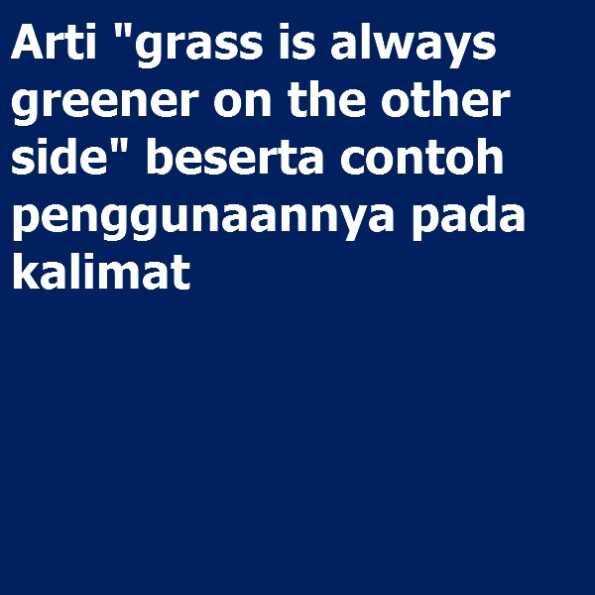
Apa arti atau makna idiom "grass is always greener on the other side" serta bagaimana contoh penggunaannya pada kalimat?
Saya akan membahas mengenai sebuah idiom dalam bahasa Inggris, yaitu "grass is always greener on the other side". Sebelum kita masuk ke pengertian idiom tersebut, perlu diketahui bahwa idiom adalah kumpulan kata atau frasa yang memiliki arti kiasan atau tidak sesuai dengan arti kata per katanya.
"Grass is always greener on the other side" adalah sebuah idiom yang artinya seseorang selalu merasa bahwa situasi atau kondisi orang lain lebih baik daripada dirinya sendiri. Idiom ini berasal dari sebuah lagu musikal yang berjudul "The Girl I Left Behind Me" pada tahun 1800an. Istilah "the other side of the fence" diambil dari lagu tersebut, kemudian berkembang menjadi "the grass is always greener on the other side of the fence".
Untuk menggunakan idiom ini dalam kalimat, kita dapat menggunakan rumus "The grass is always greener on the other side (of the fence)" diikuti dengan subjek kalimat dan kata kerja yang sesuai. Berikut ini adalah contoh kalimat dalam berbagai bentuk, tenses, dan penggunaan pronoun:
- I always think that the grass is always greener on the other side. (Saya selalu berpikir bahwa rumput selalu lebih hijau di sebelah sana.)
- You might think the grass is always greener on the other side, but it's not always true. (Kamu mungkin berpikir bahwa rumput selalu lebih hijau di sebelah sana, tapi itu tidak selalu benar.)
- We often hear that the grass is always greener on the other side of the fence. (Kita sering mendengar bahwa rumput selalu lebih hijau di sebelah sana pagar.)
- They believe that the grass is always greener on the other side, so they never satisfied with what they have. (Mereka percaya bahwa rumput selalu lebih hijau di sebelah sana, sehingga mereka tidak pernah puas dengan apa yang mereka miliki.)
- He thinks the grass is always greener on the other side of the world. (Dia berpikir bahwa rumput selalu lebih hijau di sebelah sana dunia.)
- She used to think the grass is always greener on the other side, but now she appreciates what she has. (Dia dulu berpikir bahwa rumput selalu lebih hijau di sebelah sana, tetapi sekarang dia menghargai apa yang dimilikinya.)
- It seems that the grass is always greener on the other side of the street. (Sepertinya rumput selalu lebih hijau di sebelah sana jalan.)
- I wish I could be in his position, but I know that the grass is always greener on the other side. (Saya berharap bisa berada di posisinya, tapi saya tahu bahwa rumput selalu lebih hijau di sebelah sana.)
- You shouldn't always think that the grass is always greener on the other side, because you might miss the good things you have now. (Kamu tidak boleh selalu berpikir bahwa rumput selalu lebih hijau di sebelah sana, karena kamu mungkin melewatkan hal-hal baik yang kamu miliki sekarang.)
Itu tadi penjelasan tentang arti atau makna idiom "grass is always greener on the other side" serta contoh penggunaannya pada kalimat.
